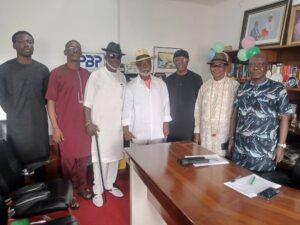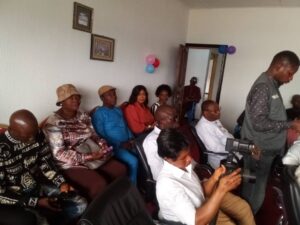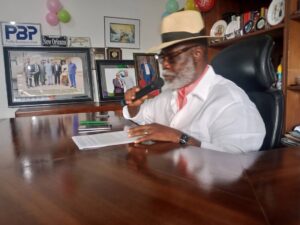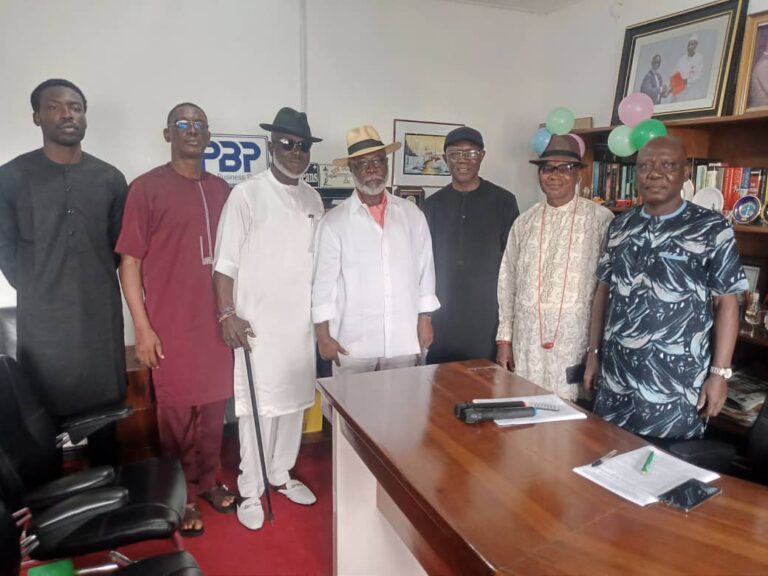


Foremost Ijaw leader and elder statesman, Mr Joseph Ambakederimo has lamented that Nigeria’s experience with democratic governance has not translated into widespread prosperity, citing factors such as corruption, dependence on oil revenue, and lack of investment in human capital.
Mr Ambakederimo, on Friday in Warri, Delta at his birthday breakfast media chat series called for a more diversified economy, improved education and healthcare, and inclusive growth to benefit all segments of society.
Mr Ambakederimo who is the National Convener of the South South Reawakening Group (SSRG) and the BoT Chairman of Community Development Committees of Niger Delta Oil and Gas Producing (CDS), in his address highlighted the challenges facing Nigeria’s democracy, including political ignorance, corruption, and weak institutions.
The foremost Ijaw leader who turned 64 years, Friday, August 15th, emphasized the need for accountability, representation, and protection of human rights to ensure that democracy serves the people.
In his address entitled; ” Democracy At The Crossroads .The Leadership Question And The Peoples Welfare”, the SSRG leader lamented the lack of ideological clarity among political parties and the tendency for politicians to prioritize personal interests over the welfare of the people.
He harped on the need for a strengthened democratic system, with a focus on accountability, transparency, and citizen participation.
Mr Ambakederimo also emphasized the importance of addressing the challenges facing Nigeria’s economy and promoting inclusive growth to ensure that democracy serves the people.
He called for a renewed commitment to democratic principles and a more proactive approach to addressing the needs and concerns of the Nigerian people.
“A democratic system can be strengthened by policies that promote social and economic well-being, while a strong welfare state can create a more stable and participatory democracy”, he said.
According to him, by strengthening institutions, promoting citizen participation, and addressing the challenges facing the economy, Nigeria can create a more conducive environment for democracy and wealth creation, leading to a more prosperous and equitable society.
Here Is His Full Address Delivered At His 64 years birthday Breakfast Media Chat:
BIRTHDAY BREAKFAST MEDIA CHAT SERIES BY JOSEPH AMBAKEDERIMO, FOREMOST IJAW LEADER & ELDER STATESMAN @ 64. FRIDAY 15TH AUGUST, 2025
My courtesy’s distinguished guest, ladies and gentlemen of the Press.
DEMOCRACY AT THE CROSS ROAD. THE LEADERSHIP QUESTION AND THE PEOPLES WELFARE
Democracy intends to be the government of the people…how true and how has this theory applicable to the Nigerian experience vis-a-vis the economic growth and development in the upliftment of the everyday Nigerian. The advent of democratic rule in 1999 was seen and hoped to be a means to empower the people and as a dawn of a new era when viewed side by side when we exited the military rule for a new democratic order. So far what we find are excuses upon excuses and promises of a better tomorrow that has not been realized. The tomorrow has always come because today is the tomorrow we have been waiting for yesterday.
In discussing democracy and the evolving of political parties and party politics role in delivering the dividends of democracy cannot be wished away with the wave of the hand. Political parties are the vehicle on which the dividends of democracy ought to be delivered to the people.
POLITICAL IGNORANCE:
But all too often, the people have all too little understanding of what they rule over. Political ignorance is a ubiquitous and persistent problem in modern democracy. It strengthens the case for limiting and decentralizing political power, and for judicial review.
Much evidence shows that the public is ignorant about many aspects of government and public policy. The public is also often ignorant about the basic structure of government. It is an affirmation that only about 30% of Nigerians can even name the three branches of the Federal government: Executive, legislature and Judiciary. Political ignorance has remained at roughly the same level for decades, despite rising educational attainment. Public ignorance is not the result of stupidity or lack of available information. The internet and other modern technology has made political information more widely available than ever before in human history. The Average IQ scores have risen substantially over the last several decades. The problem is not lack of information or intelligence. It is that most of us are not using our intelligence to learn and process the political information that is readily available such behavior is actually rational. If your only incentive to follow politics is to be a better voter, that isn’t much of an incentive at all. There is very little chance that your vote will actually make a difference to the outcome of an election (about 1 in 1 million in a presidential race, for example). There is little point in spending more than a minimal amount of time acquiring the knowledge you need to make a well-informed choice if that choice is so unlikely to make any difference.
Some people, of course, follow politics for reasons other than becoming better voters. Just as sports fans love to follow their favorite teams, so “political fans” love to cheer on their favorite candidates, parties, or ideologies, but do we play politics of ideologies now days, how much do we know of the ideologies of the existing political parties, even the ones who are standing at the rostrum shouting themselves coarse that they want to make Nigeria better or a “New Nigeria is possible” haven’t put forward any of their parties ideologies or programs hence everything seems in disarray. Ladies and gentlemen less we say that the people are caught in a melee that may remain so for a very long time to come.
How Democracy Supports People Welfare:
Accountability and Representation:
In a democracy, elected officials are accountable to the people. This accountability encourages them to enact policies that benefit the population, including those related to social welfare.
Citizen Participation:
Democracies often provide platforms for citizens to voice their concerns and participate in decision-making processes. This can lead to policies that are more responsive to the needs and desires of the population.
Protection of Rights:
Democracies typically protect fundamental human rights, including social and economic rights, which are crucial for ensuring a basic standard of living for all citizens.
How Welfare States Support Democracy:
Reduced Inequality:
Welfare states aim to reduce income inequality and provide a safety net for those in need. This can reduce social unrest and create a more stable society, which in turn supports democratic stability.
Increased Political Participation:
When citizens have their basic needs met, they are more likely to be engaged in the political process and participate in elections.
Social Cohesion:
Welfare policies can promote social cohesion by addressing inequalities and providing support for vulnerable populations. This can strengthen the social fabric and foster a sense of shared responsibility.
Examples:
Many countries with robust welfare systems, such as those in Scandinavia, also have high levels of democratic participation and social well-being.
Conversely, countries with weak democratic institutions and a lack of social welfare policies often face social and economic challenges that can undermine
democratic stability. People’s welfare are mutually reinforcing.
A democratic system can be strengthened by policies that promote social and economic well-being, while a strong welfare state can create a more stable and participatory democracy.
Failure of Government and Governance:
Right now we are a confused bunch, not knowing what system of government best suit our fancy, the form of government that will provide for us sustenance of our basic needs and provide security. The clamour for return to parliamentary rule comes and goes intermittently after we have consistently ripped the present constitution apart, albeit with some claiming that it is not written by the people (Nigerians) for some of us the present constitution is still near a perfect piece of document, what l see is that the operators of the constitution are the problem and not the constitution in itself.
In Nigeria, the relationship between democracy and wealth creation is complex. While democracy is generally believed to be a catalyst for economic development, including wealth creation, Nigeria’s experience with democratic governance has not consistently translated into widespread prosperity. Factors like corruption, weak institutions, and dependence on oil revenue hinder the effective utilization of democratic processes for wealth generation.
The Way Forward:
To harness the potential of democracy for wealth creation in Nigeria, it is crucial to address the challenges mentioned above. This includes:
Strengthening institutions to ensure transparency, accountability, and the rule of law.
Diversifying the economy beyond oil to create more sustainable sources of wealth.
Investing in human capital through education and healthcare to improve productivity and promote social mobility.
Promoting inclusive growth that benefits all segments of society, reducing poverty and inequality.
Combating corruption and ensuring that public resources are used for the benefit of all Nigerians.
Strengthening democratic institutions and promoting citizen participation in governance.
By addressing these issues, Nigeria can create a more conducive environment for both democracy and wealth creation, leading to a more prosperous and near equitable society.
Thank you and God bless you all real good.
Joseph Ambakederimo,
Foremost Ijaw Leader and Elder statesman.
Convener South South Reawakening Group ( SSRG)
15th August, 2025.


